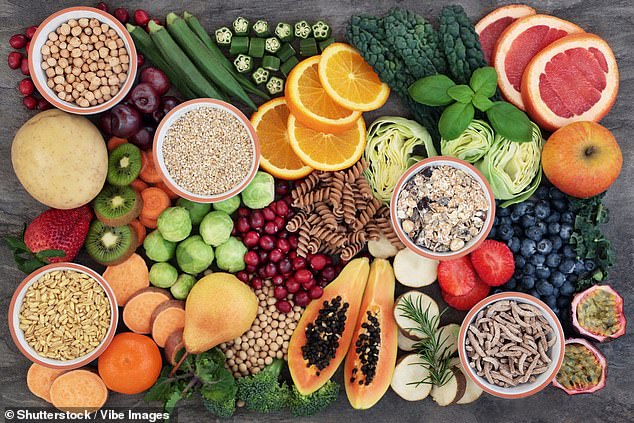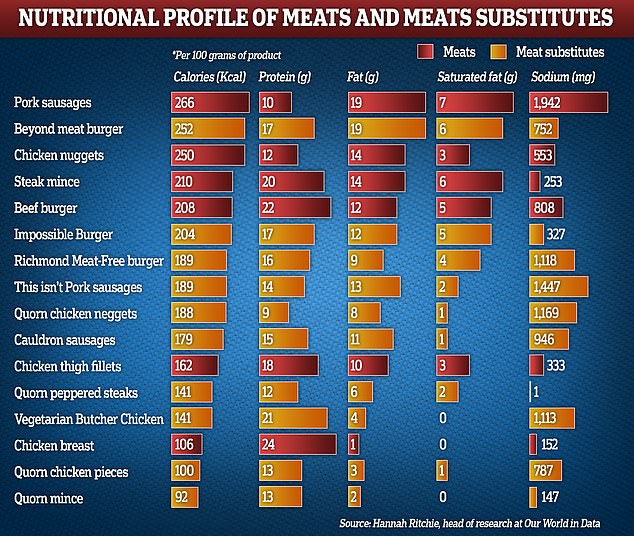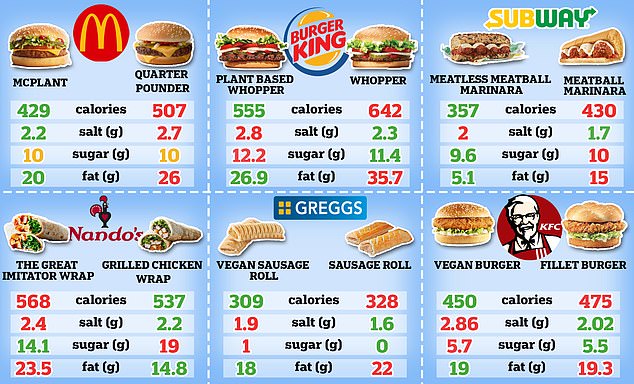Eating a diet rich in unhealthy plant foods could increase the risk of dying prematurely, a major British analysis suggests.
Dutch scientists, who analyzed data from 70,000 Britons, found that people who frequently ate vegan desserts, bread and roast potatoes were more likely to be frail in middle age, a reliable indicator of premature death.
In comparison, those who consumed plant-based diets rich in fresh fruits and vegetables and low-fat alternatives like tofu were much stronger physically.
Frailty is a medical term for those struggling to recover from common health problems, such as bad colds or an injury resulting from an accident such as a fall.
According to studies, each step in worsening frailty is linked to an 80 percent increase in the risk of death upon admission to the hospital.
While the new study saw an increased risk of frailty in all people who ate more unhealthy plant-based foods, the risk was significantly higher in poorer men.
They published their findings in The Journal of Nutrition, Health and AgingScientists found that poorer British men who ate more unhealthy vegan or vegetarian foods were 18 percent more likely to suffer from frailty, compared to the average person in the study.
They suggested that higher intake of soft drinks in this group could be the cause of this increased risk, but added that more research is needed.
Eating more unhealthy plant foods could increase the risk of dying prematurely, a major British analysis suggests. stock image
In the analysis, researchers examined diet, income and health data from just over 73,000 Britons aged 40 to 70, with an average age of 55.
Each participant was given a score based on their dietary information and was assigned points for healthy and unhealthy plant-based foods.
Foods such as fresh fruits and vegetables and meat substitutes such as tofu were classified as healthy plant-based foods.
On the contrary, those such as white bread, fried or roasted potatoes and vegan desserts were classified as unhealthy.
The researchers also recorded the amount of animal products consumed daily and gave a negative point for each.
These data were then compared to each participant’s frailty assessment as well as income.
Frailty was defined in the study if a person met at least three of five criteria.
These included: Weight loss over the previous year, feeling tired or lacking energy on more than half of the days in the last fortnight, little or no exercise. per week and a slower than usual walking pace or lower grip strength than expected for the sex and weight of the participants.
Low incomes were established as those with a household income of less than £18,000 per annum.

Every 10 points for eating healthy plant-based foods, such as fresh fruits and vegetables, was associated with a 3 percent lower chance of frailty in the study.
The analysis found that every 10-point increase in unhealthy plant foods score was linked to a 7.7 percent increase in frailty.
But this figure rose to 18 percent when the scientists looked specifically at men with lower family incomes.
They said this could, in theory, double the likelihood of these men suffering from frailty, although the study itself did not provide examples of typical scores.
For reasons that remain unclear, this observed increase in frailty was not observed in the poorest women.
In contrast, every 10 points of eating healthy plant-based foods was associated with a 3 percent lower likelihood of frailty across the entire study group.
The scientists added that a “remarkable” finding was that eating more unhealthy plant-based foods did not appear to increase the risk of frailty among higher-income Britons, those defined as those with a household income of more than £52,000 a year.
They theorized that the difference in fragility between healthy and unhealthy plant-based diets could be due to the contrasting levels of nutrients in these foods.
A diet full of fresh fruits and vegetables contains more vitamins and minerals essential for the body’s healthy functioning than one full of refined grains like white bread and soda, even though both are vegetarians, they noted.
They also highlighted that women in the study, on average, consumed more calcium from dairy than men, and this could help prevent frailty.
Calcium is considered a key mineral for improving bone and muscle health.

Figures from Hannah Ritchie from Oxford University’s Our World in Data reveal how much salt and fat many meat alternatives contain compared to real meat. The researchers compared the nutritional content of 100g of meat products and vegan products, all available in UK supermarkets.
Additionally, experts noted that frail men from low-income households specifically had the highest soda consumption per person in the study.
“Future research can explore how dairy and reducing soft drink consumption can fit into a healthy plant-based diet to help reduce the risk of frailty,” they said.
They added that their research suggested that men with lower incomes may be a particularly vulnerable group who could benefit from dietary interventions.
Lower incomes have long been linked to worse health outcomes. In addition to diet, factors such as increased risk of mental health problems due to economic challenges and barriers to accessing healthcare are considered to contribute to this trend.
While the new research represents a large-scale analysis, the authors acknowledged that their study had a number of limitations.
Firstly, they highlighted how the number of Britons who met the definition of frailty in the study was low: only around 1,000 of the 73,000 participants.
The experts added that the sample of participants was generally healthier, wealthier and less diverse than the general British population, which could influence the results.
Experts have repeatedly raised the alarm about unhealthy vegan foods, particularly meat substitutes.

Meat-free alternatives to the UK’s favorite fast food can be saltier, loaded with sugar and fat, MailOnline can reveal. Only McDonald’s plant-based option, the McPlant, appears healthier than its closest beef-based option, the famous Quarter Pounder with Cheese. The graph shows the calorie, salt, sugar and fat content of each chain’s traditional and vegan options, with green indicating which product has the lowest level, red indicating the highest figure, and yellow meaning they are identical.
Some scientists have said more needs to be done to counteract the “health halo” effect surrounding meat substitutes, as consumers mistakenly think they are healthier than traditional meat-based options.
Earlier this year, British experts found that those who ate fake sausages, burgers and mince appeared to have worse blood pressure than their meat-eating counterparts.
Meanwhile, another recent study found that opting for ultra-processed plant foods, such as vegan sausages and burgers, as well as cakes and chips, was linked to a 15 percent higher risk of heart attacks and strokes.
Interest in a plant-based diet has skyrocketed in recent years, with vegans citing ethical, environmental or health reasons.
It is almost impossible to establish the exact number of vegans there are currently in the UK.
But a recent survey suggested that around 600,000 people are believed to follow a plant-based diet.


